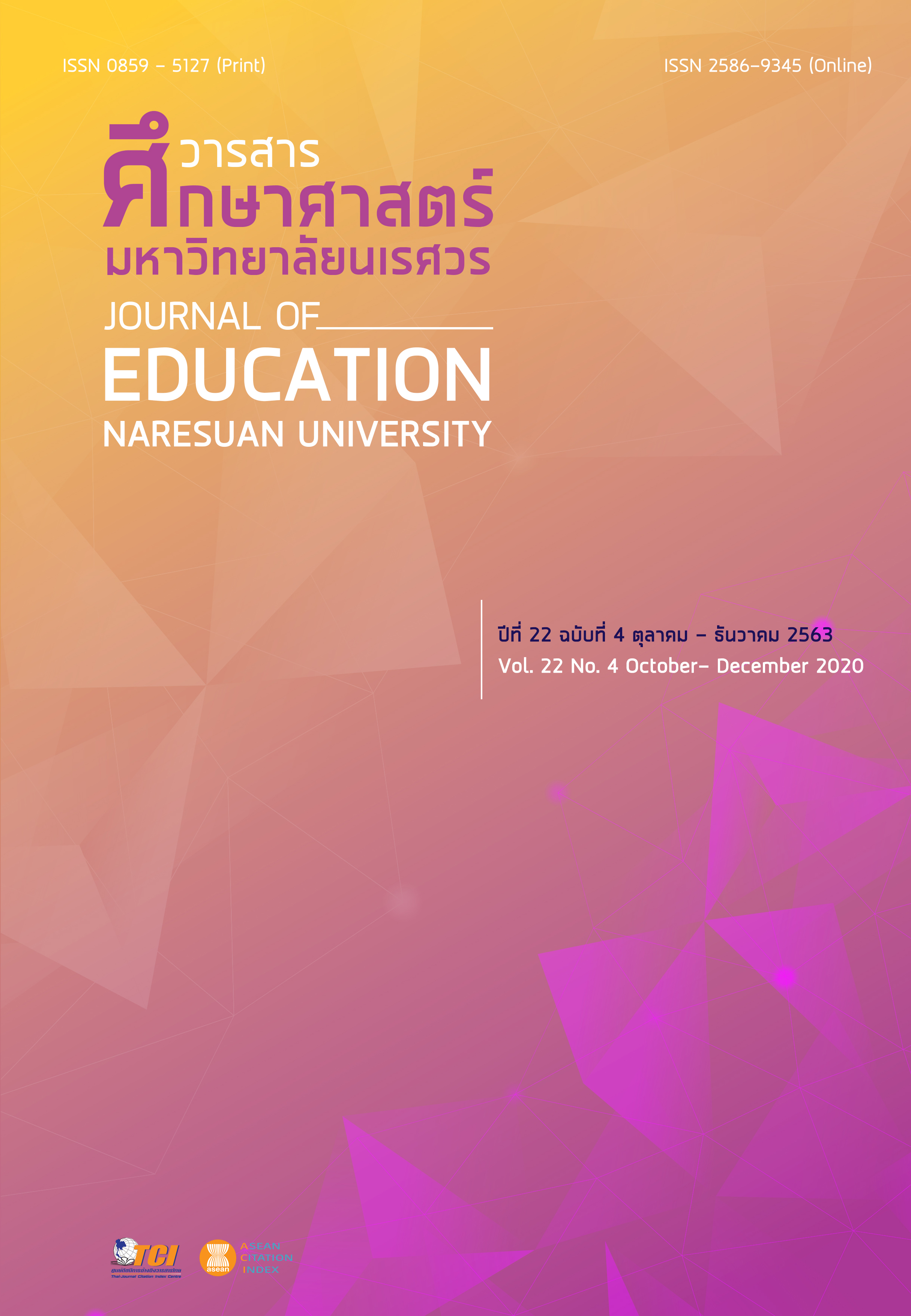A DEVELOPMENT OF TEACHERS NETWORK FOR DEVELOPING HOLISTIC LEARNING INNOVATION การพัฒนาเครือข่ายครูในการพัฒนานวัตกรรมการเรียนรู้ที่พัฒนาผู้เรียนแบบองค์รวม
Main Article Content
Abstract
This research aimed to develop a teachers’ network for developing holistic learning innovation to provide learners with competencies and attributes that meet national educational goals. The research methodology used the participatory action research process in 4 steps; 1) studying the pre-existing teachers’ network conditions, 2) developing a teachers’ network for the development of innovative learning that develops students holistically, 3) studying the effectiveness of teacher’s network, and 4) disseminating knowledge in the teachers’ network. Data was gotten from four different groups including: 1) A group fifty primary school teachers, 2) four educational supervisors, 3) five school administrators, and 4) three lecturers from the Faculty of Education. The research instruments included teachers’ network model, innovation recording form for teachers’ learning activities, 3Rs and 8Cs assessment test with validity from 5 experts. Data was collected by organizing a seminar. Data were analyzed using percentage, percentage of progress, and content analysis. The results revealed that: 1) the pre-existing teacher network conditions were not systematically and not well developed to be used throughout the entire school system and as such the driving force for its functioning of the previous projects were not enough, 2) the learning process in the learning network is characterized by knowledge-based practices and knowledge creation learning activities with a clear operational goal of developing holistic learners who will learn enthusiastically, to find solutions that lead to success, and systematic recording. There were reflections to learn from the lessons after each learning practice and there were also knowledge sharing activities based on the results by practitioners and team members in order to further develop the network, and 3) the effectiveness of teacher network found that 3.1) there are a total a 47 holistic learner developing learning innovations, classified as in terms of type, technique and method accounting to 29.78%, technological innovations for learning accounted for 51.06% and technique or method together with Information technology for learning accounted for 19.15%, 3.2) learners’ 3Rs skills improved progressively with a score ranging between 7.55 - 38.66% and 8Cs skills also improved progressively with a score between 10.60 - 26.80%, and 4) the factors leading to effective functioning of the teachers’ network are the cooperation and the gratitude of the personnel and members from all sectors. The strength of the PLC group through often meetings with common group agreements with common goals acted as a source of motivation to all members of the school network. There was also continuous supervision and evaluation of members by the educational supervisors and university lecturers and their activities which led to effective functioning of the teachers’ network.
Article Details

This work is licensed under a Creative Commons Attribution-NonCommercial-NoDerivatives 4.0 International License.
The owner of the article does not copy or violate any of its copyright. If any copyright infringement occurs or prosecution, in any case, the Editorial Board is not involved in all the rights to the owner of the article to be performed.
References
Dweck, C. (2006). Mindset: The new psychology of success. New York: Ballantine.
Erickson, J., & Johnson, G. (2011). Internet use and psychological wellness during late adulthood. Canadian Journal on Aging/La Revue Canadienne Du Vieillissement, 30(2), 197-209. doi:10.1017/S0714980811000109
Hord, S. M., Roussin, J. L., & Sommers, W. A. (2010). Guiding professional learning communities: Inspiration, challenge, surprise, and meaning. Thousand Oaks, Calif: Corwin.
Khammani, T. (2015). Science of teaching: Body of knowledge for efficient learning organization (18th ed). Bangkok: Chulalongkorn University. [in Thai]
Kosiyakul, S. (2009). Research and development to encourage innovation of teacher’s and educational personnel’s network to enhance quality of students phase II: Kamphaeng Phet. Kamphaeng Phet: Kamphaeng Phet Rajabhat University. [in Thai]
Martin, M. (2011) Professional learning communities. In: McMahon, M., Forde, C. and Martin, M. (eds.) Contemporary Issues in Learning and Teaching. Sage.
Niyom, P. (2011). Learning reform to learners. Bangkok: Ministry of Education. [in Thai]
Office of the Basic Education Commission. (2018). Policy of the Office of the Education Commission Basic budget year 2018. Retrieved from http://www.obec.go.th/wp-content/uploads/2018/08/obec61.pdf [in Thai]
Office of the Education Council. (2017). National Scheme of Education of B.E. 2560-2579 (2017-2036) (2nd ed). Bangkok: Office of the Education Council. [in Thai]
Secretariat of the House of Representatives. (2016). Teacher problem: a problem that is a waiting reform. Retrieved from http://www.parliament.go.th [in Thai]
Serirat, B. (2017). The development of a model for building a professional learning community for promoting the idea set about teaching of elementary school teachers. Sri Pathum Review, Humanities edition and Social Sciences, 17(1), 115-122. [in Thai]
Sullivan, S., & Glanz, J. (2005). Supervision That improves teaching. California: Gawin.
The institute for the Promotion of Teaching Science and Technology. (2016). Science and technology with Thai people in new economic era based on knowledge. Bangkok: National Science and Technology Development Agency. [in Thai]
Trilling, B., & Fadel, C. (2009). 21st century skills: Learning for life in our times. San Francisco, CA: John Wiley & Sons.


